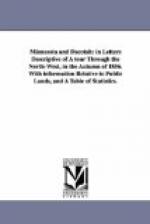He, however, who enters the profession here or elsewhere merely as a stepping stone to political preferment, need not expect great success, even though he may acquire some temporary advancement. The day is past when lawyers could monopolize every high place in the state. The habit of public speaking is not now confined to the learned professions. Our peculiar system of education has trained up a legion of orators and politicians outside of the bar. Now-a-days a man must have other qualifications besides the faculty of speech-making to win the prize in politics. He must be a man of comprehensive ability, and thoroughly identified with the interests of the people, before he can secure much popular favor, or else he must be possessed of such shining talents and character that his fellow men will take a pride in advancing him to conspicuous and responsible trusts. Let a man have a part or all of these qualifications, however, and with them the experience and tact of a lawyer, and he will of course make a more valuable public servant, especially if he is placed in a deliberative body. The British cabinets have always relied vastly on the support afforded them in the house of commons by their attorneys and solicitors general, whether it consisted in the severe and solemn logic of Romilly, in the cool and ready arguments of Scarlett, or the acute and irresistible oratory of Sir William Follett. The education of a lawyer;— his experience as a manager; his art of covering up weak points, his ready and adroit style of speaking;—




